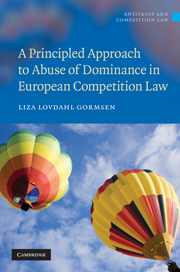Book contents
2 - Consumer welfare theory, different schools of thought and efficiencies
Published online by Cambridge University Press: 24 April 2010
Summary
Introduction
Many jurisdictions embracing competition law state that the objective is to improve consumer welfare. Some argue that consumer welfare is also an objective in European competition law. To be able to examine whether consumer welfare conflicts with any other objectives pursued in Article 82, it is necessary to clarify the concept. There is no precise definition of the term ‘consumer welfare’. The EC Treaty has not assigned a specific meaning to the concept of consumer welfare, or other variants of welfare, and its meaning is not entirely clear. The expression ‘consumer welfare’ has several interpretations and it has sometimes been misunderstood in competition law analysis. Consequently, the term ‘consumer welfare’ requires clarification. This chapter is written from a legal perspective, so it does not attempt to suggest a new definition of consumer welfare, but will describe the current understanding of the term and its contours for the purpose of examining a potential conflict. Subsequent chapters will also refer to consumer welfare, so this chapter provides a point of reference which will continuously be referred to and used in later chapters.
Consumer welfare is an economic term, but is increasingly used in the legal sphere, including the sphere of European competition law, where the Commission has devoted itself to a more ‘economic approach’ in respect of competition law.
- Type
- Chapter
- Information
- Publisher: Cambridge University PressPrint publication year: 2010

